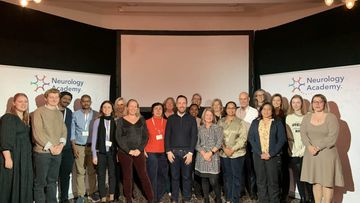Get involved – MS Service Provision in the UK 2019; Raising the Bar
→ Register for this meetingFollowing our recent MS Academy Variance meeting in Birmingham on the 1 and 2 of November 2018, we have now had time to reflect on the meeting. We would like to expand and diversify the steering committee so that we can tackle some of the issues that were highlighted at the meeting. We need action and preparation for some of the activities that we are proposing for the follow-on meeting to be on 8 and 9 July 2019, in Birmingham.At next year’s follow-on meeting we are proposing a national MS services audit using a recently developed International quality improvement tool. The latter will be led by Prof Jeremy Hobart. At the same meeting, we plan to celebrate our successes and to share best practice. We propose inviting MS centres to submit cases studies of something they have done right to improve the outcome of their patients with MS. All centres who submit a case study will be asked to present a poster in the breaks. We will select 3-4 of the best case studies for platform presentations and more detailed discussions. The aim of this component of the meeting is not only to share best practice but to encourage wide adoption of these practices.The ‘audit’ and ‘best practice’ sessions will be followed by specific workstreams to address the priorities raised at the Birmingham meeting. These will include:
- Working differently (Jeremy Hobart): what can be done to change the NHS service model to improve how we practice and deliver our MS Services?
- Data usage (David Rog): This workstream will demonstrate how we can use existing data sources to tell a story about our individual services. The idea is to empower MS services to engage with data scientists to extract, analyse and use data relevant to their service.
- Patient Activation (MSer): The aim of this workstream is to design and implement a national expert patient-like training course to activate people with MS to become active partners in their care. This will include self-monitoring, self-management and other initiatives for patients to help with the development and running of their MS services. The idea is for each MS Service to set-up and run these courses locally.
- Social Determinants of Health (Helen Ford): This workstream will look at the impact of things outside of our immediate (NHS) control that affects MS outcomes. This will include things such as social isolation, deprivation, poor education, etc. It was clear that social factors need to be addressed if we have any hope of providing equitable NHS services to our patients. This workstream will help identify national and local partners to help address these issues.
- Leadership (Dr Gabriele De Luca): This will look at providing leadership training for key people in the MS Centres to give them the necessary skills to be able to transform their services.
Related articles
Encouraging excellence, developing leaders, inspiring change
MS Academy was established five years ago and in that time has accomplished a huge amount. The six different levels of specialist MS training are dedicated to case-based learning and practical application of cutting edge research. Home to national programme Raising the Bar and the fantastic workstream content it is producing, this is an exciting Academy to belong to.


